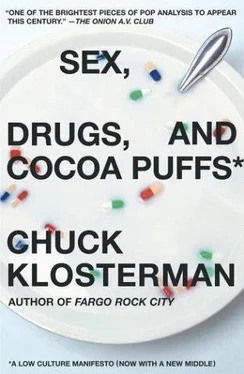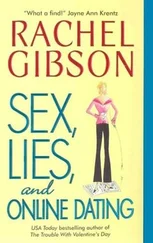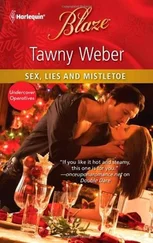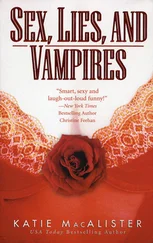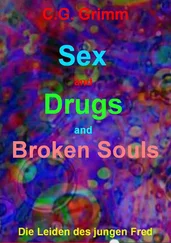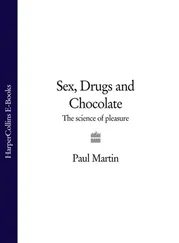There’s a scene late in The Empire Strikes Back where Luke and Vader are having their epic light-saber duel, and one particular shot is filmed from behind Mark Hamill. Within the context of this shot, Darth Vader is roughly twice the physical size of Luke; obviously, the filmmakers are trying to illustrate a point about the massive size of the Empire and the relative impotence of the fledgling Jedi. Not surprisingly, they all go a bit overboard: Vader’s head appears larger than Luke’s entire torso, which sort of overextends any suspension of disbelief a rational adult might harbor. But to a wide-eyed youngster, that image looked completely reasonable: If Vader is Luke’s father (as we would learn minutes later), then Vader should seem as big as your dad.
As the scene continues, Luke is driven out onto a catwalk, where he loses his right hand and is informed that he’s the heir to the intergalactic Osama bin Laden. He more or less tries to commit suicide. Now, Luke is saved from this fate (of course), and since this is a movie, logic tells us that (of course) Vader will fall in the next installment of the series, even though it will take three years to get there. This is all understood. But that understanding is an adult understanding. As an eight-year-old, the final message of The Empire Strikes Back felt remarkably hopeless: Luke’s a good person, but Luke still lost . And it wasn’t like the end of Rocky, where Apollo Creed wins the split decision but Rocky wins a larger victory for the human spirit; Darth Vader beats Luke the way Ike used to beat Tina. A psychologist once told me that—over the span of her entire career—she had never known a man who didn’t have some kind of creepy, unresolved issue with his father. She told me that’s just an inherent part of being male. And here we have a movie where the hero is fighting every ideology he hates, gets his ass kicked, and is then informed, “Oh, and by the way: I’m your dad. But you knew that all along.”
In this same scene, Darth Vader tells Skywalker he has to make a decision: He can keep fighting a war he will probably lose, or he can compromise his ethics and succeed wildly. Many young adults face a similar decision after college, and those seen as “responsible” inevitably choose the latter path. However, an eight-year-old would never sell out. Little kids will always take the righteous option. And what’s intriguing about Gen Xers is they never really wavered from that decision. Luke’s quandary in The Empire Strikes Back is exactly like the situation facing Winona Ryder in 1994’s Reality Bites : Should she stick with the nice, sensible guy who treats her well (Ben Stiller), or should she roll the dice with the frustrating boho bozo who treats her like crap (Ethan Hawke)? For a detached adult, that answer seems obvious; for people who were twenty-one when this move came out, the answer was just as obvious but completely different. As we all know, Winona went with Hawke. She had to. When Gene Siskel and Roger Ebert reviewed Reality Bites, I recall them complaining that Ryder picked the wrong guy; as far as I could tell, choosing the wrong guy was the whole point.
You don’t often see Reality Bites mentioned as an important (or even as a particularly good) film, but it grows more seminal with every passing year. When it was originally released, all its Gap jokes and AIDS fears and Lisa Loeb songs merely seemed like marketing strategies and ephemeral stabs at insight. However, it’s amazing how one film so completely captured every hyper-conventional ideal of such a short-lived era; Reality Bites is a period piece in the best sense of the term. And in the same way I have a special place in my heart for the first film I saw inside a movie house, I reserve a special place in my consciousness for the first film so unabashedly directed toward the condition of my own life. I was graduating from college the spring Reality Bites was released, and—though it didn’t necessarily seem like a movie about me—it was clearly a movie for me. Eighteen months earlier, everyone I knew had seen Cameron Crowe’s Singles, which we initially viewed as a youth movie. When we went back and rented Singles in the summer of 1994, I was suddenly struck by how old its cast seemed. I mean, they had full-time jobs and wanted to get married and have babies. Singles was just a normal romantic comedy that happened to have Soundgarden on the soundtrack. Reality Bites was an equally mediocre movie, but it validated a lot of mediocre lives, most notably my own. As I stated earlier, all the clichés about Gen Xers were true—but the point everyone failed to make was that our whole demographic was comprised of cynical optimists. Whenever my circa-1993 friends and I would sit around and discuss the future, there was always the omnipresent sentiment that the world was on the decline, but we were somehow destined to succeed individually. Everyone felt they would somehow be the exception within an otherwise grim universe. This is why Ryder had to pick Hawke. Winona made the kind of romantic decision most people my age would have made in 1994: She pursued a path that was difficult and depressing, and she did so because it showed the slightest potential for transcendence. Not coincidentally, this is also the Jedi’s path. Adventure? Excitement? The Jedi craves not these things. However, he does crave something greater than the bloodless existence of his father. Quite simply, Winona Ryder is Luke Skywalker, only with a better haircut and a killer rack.
Part of the reason so many critics think The Empire Strikes Back is the best Star Wars movie is just a product of how theater works: Empire is the second act of a three-act production, and the second act is usually the best part. The second act contains the conflict. And as someone born in the summer of 1972, I’ve sort of come to realize I’m part of a second-act generation. The most popular three-act play of the twentieth century is obvious: The Depression (Act I), World War II (Act II), and the sock-hop serenity of Richie Cunningham’s 1950s (Act III). The narrative arc is clear. But the play containing my life is a little more amorphous and a little less exciting, and test audiences are mixed: The first act started in 1962 and has a lot of good music and weird costumes, but the second act was poorly choreographed. Half the cast ran in place while the other half just sat around in coffee-houses, and we all tried to figure out what we were supposed to do with a society that had more media than intellect (and more irony than personality). Maybe the curtain on Act II fell with the World Trade Center. And as I look back at the best years of my life, I find myself wondering if maybe I wasn’t unconsciously conditioned to exist somewhere in the middle of two better stories, caught between the invention of the recent past and the valor of the coming future. Personally, I don’t think I truly understand invention or valor; they seem like pursuits that would require a light saber.
Within the circuits of my mind, the moments in The Empire Strikes Back I most adore are whenever Yoda gives his little Vince Lombardi speeches, often explaining that—in life—there is no inherent value to effort. “Do, or do not,” says the greenish Muggsy Bogues. “There is no try .” And that’s an inspiring sentiment. It’s the kind of logic that drives the world. But in my heart of hearts, the part of the film I can’t shake is when Luke Skywalker and Han Solo are riding around Hoth on tauntans, which are (for all practical purposes) bipedal space horses. When things get rough, Han Solo cuts open the belly of a tauntan and stuffs Luke inside the carcass; he saves him from a raging blizzard by encasing him in a cocoon of guts. I assume we’re supposed to find this clever and disgusting (or maybe even inventive and heroic). But I just know I’d rather be inside the belly of the beast.
Читать дальше
